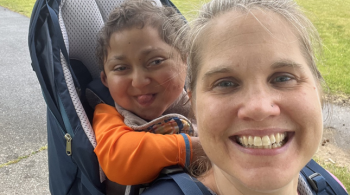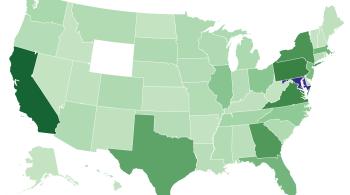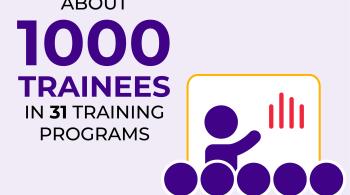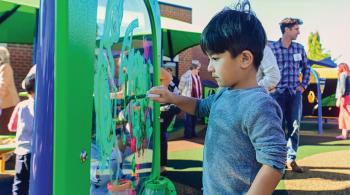The Impact of Technology on Reading and Literacy
Check out the latest episode of Your Child’s Brain. Join Dr. Brad Schlaggar, president and CEO of Kennedy Krieger Institute and his guests Heidi Daniel, president and CEO at the Enoch Pratt Free Library in Baltimore, and Dr. Tzipi Horowitz-Kraus, a developmental neuroscientist at Kennedy Krieger Institute they discuss children's reading, literacy and the impact of technology on both.
Speakers for this month's episode include:
- Dr. Tzipi Horowitz-Kraus, a developmental neuroscientist at Kennedy Krieger Institute
- Heidi Daniel, president and CEO at the Enoch Pratt Free Library
Resources:
Learn More About Kennedy Krieger Faculty & Staff Members Featured in This Episode
Learn More About Kennedy Krieger Faculty & Staff Members Featured in This Episode
View Episode Transcription
Dr. Brad Schlaggar (BS): Welcome to Your Child's Brain, a podcast series produced by Kennedy Krieger Institute with assistance from WYPR. I'm Dr. Brad Schlaggar, pediatric neurologist and president and CEO of Kennedy Krieger Institute. One of the most distinctive features of the human brain is its capacity for language. Arguably, our brains have evolved to produce spoken and heard language. But exactly when that capacity emerged in humans is debated, in the scientific literature, spoken language likely emerged no less than a couple of 100,000 years ago and perhaps as long ago as one million or more years. On the other hand, the invention of the written form of language and therefore the origins of reading, came roughly 5,000 years ago. Simply put, while our brains evolved for spoken language, reading and writing are far too recent to have been drivers for the evolution of our brains. It has only been in the last several 100 years that human society has put such a premium on the value of reading that large portions of society learned to read. That said, in Maryland and in the US as a whole and while estimates vary, roughly one in five adults has very low or absent literacy skills, contributing to significant challenges for the health and welfare of those individuals. For some, reading difficulty is largely the consequence of lack of access to quality education while for others, the issue is dyslexia or a reading impairment, despite sufficient intellectual ability and access to quality education. For so many reasons, it is critically important for us to understand the full complexity of how our brains learn to read and how factors in our children's life, like screen time, for example, impact the development of this crucial skill. Today, I'm joined by two guests, both with expertise that is highly relevant to a discussion of reading development and literacy. Dr. Tzipi Horwitz-Kraus from the Department of Neuropsychology at Kennedy Krieger Institute is an international leader in the neuroscience of reading development. She's an associate professor in the Department of Psychiatry and Behavioral Science at Johns Hopkins University School of Medicine. She's also an associate professor of education and science and technology and in biomedical engineering at the Technion, Israel Institute of Technology. For full disclosure, Tzipi and I are research collaborators on the neuroscience of reading development and we published several papers together. Heidi Daniel is the president and CEO of the Enoch Pratt Free Library, a true gem in Baltimore, Maryland, where she has been at the helm since July of 2017. Welcome, Tzipi and Heidi. Heidi, you're completing your sixth year leading the Enoch Pratt Free Library. I know that literacy is one of the pillars of the library's strategic plan, especially focused on digital literacy and pre-literacy. Tell us about the library's approach to literacy.
Heidi Daniel (HD): The library approaches literacy the way we approach most things through the lens of access. You mentioned having access to high-quality education and high-quality materials is really important for the development of reading and literacy in our population. The library's focus is really on making sure that we're approaching learning and reading as a whole person way of looking at it. We're very focused on family literacy and for our pre-literacy skills and wanting to make sure that we're empowering parents and caregivers and the community around children to be fully literate themselves, to have the skillsets that they need to develop literacy in the children and their families and their care and their communities. Then giving access to high-quality materials to help them develop. That looks like a lot of things. It could be providing access to programming around development of brain, development of reading. It's modeling, it's doing programs that model, seeing, read, play with your children. It's providing play rich environments where children have the opportunity to play and explore while also having a lot of rent around them integrated into their play scape. Because we know that children learn through play. It's also that digital literacy piece. As we recognize that digital literacy is critical to the communities that we service and through really our whole world. We're all connected to devices and screens. How does that play out when we start to talk about children learning to read and children's brain development. Even in our teens, how does that interact with their continued growth and development? We really want to make sure that parents are educated on the impact of devices, and that they have access to high-quality apps and materials on those devices. We're not telling people to stay away from screens and only take out print books. If you know anything about the library, we've got tons of electronic resources for folks to access. But what we want to make sure is that caregivers feel empowered to make decisions around high-quality electronic usage. What apps are really educational and useful? How much screen time kids should be having? Really looking at all of the things that come into play when we talk about the interaction of literacy and devices and that they know how to correctly use them for empowerment so that it's not just that junk food approach, doing what feels good, but maybe what isn't like super nutritional for your brain. We take that approach as well as connecting families to all the additional resources they might need to support growth and learning in their home.
BS: That sets us up so well for the discussion that we're about to have. Tzipi, tell us a bit about your work on understanding how our brains learn to read.
Tzipi Horwitz-Kraus (TH-K): I've been working on the neurobiology of reading for I think 15 years now. I started coming out from a very personal place with having several family members with dyslexia, with the basically difficulty in reading, struggle with reading along the years. I saw that aside to wonderful thinking skills, great intelligence, right ability to manage in your environment. It struck me, how can it be, how can these intelligent individuals struggle with this ability that most of us are doing so naturally? I started digging in and doing the academic journal that I'm having for many years. I started looking for biomarkers, for reading difficulties, and we started looking at different neuroimaging tools or tools that helps us to understand how the brain works. We found that individuals with dyslexia, when they are adults, their brain basically does not recognize that they're making reading errors. Then we said, let's see if this is modifiable. Can we train them to better recognize words and can their brain actually realize that they made reading errors? We found that the brain is plastic, so we moved on to kids and we found that the kid's brain, even if they have dyslexia, is even more plastic than the adult brain that has dyslexia. In the past years, aside to work that we are doing with children with dyslexia and reading difficulties, and we will talk more about it, we started looking at younger kids at pre-reading age and we're trying to see whether we can minimize reading difficulties, and for better effect, not only reading difficulties, let's make all kids love reading because this is one of the most enjoyable activities that kids can do themselves and definitely can do with their parents.
BS: As I mentioned earlier, human spoken language dates back on the order of probably 100,000 or a couple of 100,000 years ago. But written language and therefore reading, it's really been around just 5,000 years. What are the implications of how relatively new reading is for the human experience? How does that affect the way you think about investigating the way the brain learns to read?
TH-K: This is an amazing question and there is a lot of literature about it that relates to this whole process as recycling these brain networks that were originally aimed to listen, to see, to pay attention to things in order to work together, so reading is accomplished. I think when we're talking about recycling these networks. This is a term coined by a researcher named Dehaene 2009. We kind of understand that maybe not all people can recycle these networks and maybe these brain networks cannot be recycled as easily for everybody. That only emphasizes how much this process is not really intuitive. Which means that in order for these networks to be active together, in order for us to see the words, to listen to the words in our thought and to pay attention to the words, then the timing of this activity needs to be very, very precise. The teaching or the tutoring of this process needs to be very explicit. So it's not intuitive for all kids.
BS: Along those lines, what does the research tell us about the best approaches and at what ages it's best to introduce a child to reading?
TH-K: Oh, wow. If we go back to the American Pediatric Association, they will tell you that a child should be exposed to reading from birth basically. If we talk about these brain regions that are related to reading, which are visual regions, auditory listening regions, attention regions, meaning, so language and vocabulary these brain networks are really ready to perceive this information at birth. I think that a fine stimulation of these brain regions using storytelling in a different way that matches the child age, using different methods like as batteries or speaking in a voice or reading the story and the voice that the young child can listen and process and then when the child is older, showing the words with the finger that the parent is reading is a great way even at early ages. We do see some of our studies that are looking at children at pre-reading age that are exposed massively or even not massively, are exposed to more hours of stories told by their parents and that they're exposed to more books in their household that even in their close environment basically show greater engagement of brain regions related to imagination when they just listen to stories so they're not seeing anything, but they can imagine the stories.
BS: So Heidi, along those same lines of this early exposure, can you talk about some of the programs that you've implemented at the Enoch Pratt Free Library for early reading opportunities for young children.
HD: As we talked about, it's really important that caregivers feel less self-conscious about doing anything right and use these intuitive techniques that come naturally to us when we're working with small and young children reading in a calm voice, letting them take breaks and walk away, letting them come back. Singing, playing with them while you're reading, letting them touch the words, pointing out the words. We do all of that naturally through our programming that we do with young children that is family-oriented. We have what people call the traditional story time at the library, we still have all of those. Then we also do some extra programs. We have a program called Books For Me that's been quite successful that really focuses in on groups of parents that partake in a cohort together and from their child's very young, we love to start at birth, right through as their children get older and even including older siblings and the experience of coming together and reading. The program really focuses on that modeling of using different techniques and there's five or six that the American Library Association really encourage parents to use that include things like singing, playing rhyming. Rhyming is really important. Showing the words doing left to right and focusing in on that phonological awareness. A lot of that can happen best through print. We also, through part of that program built home libraries because it's really important that children have access to literature and quality books in their home. I think a lot of studies show that the number of books in the home correlates with better educational outcomes later in life. So for us, we recognize that the cost of books is a big barrier and obviously we want you to come to the library and take out as many books as possible. But so many of our programs now focus on also building that home library for young children and then also even during our summer break programming for older kids and adults as well. Because it's also really important for young children to see the adults in their life reading as well so that they see that this is something important, this is something enjoyable. As the library we love to focus in on, like let your child love to read, especially as they get older, don't worry quite so much about that reading level. Obviously, there's markers and signs that you want to be thoughtful of if they're not developing correctly. But also really just let your child read books. My son is a reluctant reader and he loves Captain Underpants and I let him read that well past his level of reading, he was well beyond it lexical wise, but he just enjoyed reading them and it was the same with Diary of a Wimpy Kid. Just let them have fun and enjoy it. That's part of the beauty of reading is you get this wonderful experience out of it and it develops empathy and kindness in our brains, and really the ability to think about other people. I think sometimes when we work with parents at the public library, we have the privilege and ability to be able to say, make this a really enjoyable bonding experience with your child. Even if you're making up part of the story and they were walking away and they're coming back, it is okay, the idea of the written word being an enjoyable experience, it's also really important and having a lot of print rich environments for your child to explore is also a key development piece.
BS: We've used this term dyslexia a couple of times now. So Tzipi, let's talk about it. What is dyslexia exactly? Why do some children have difficulty learning to read, despite all the other efforts being made to enhance the environment, access to education, intellectual ability, all of that. Why still do some children have difficulty learning to read?
TH-K: Let's start with the definition for dyslexia. Dyslexia is defined as slow and inaccurate reading despite average IQ and higher. The typical exposure to written language. The reason for dyslexia is neurobiological. It's basically a brain that is active differently. Based on what we said at the beginning of the recycling of these networks that we're actually supposed to see and listen and pay attention to something that is happening in your visual field or when you hear something, there's really not surprising that there are situations that individuals just have difficulties reading. In our studies, this is exactly what we research. Is there a specific brain activity that we see in individuals with dyslexia? Can it be modified? Do we have different profiles of children with reading difficulties? Those who have attention difficulties in reading difficulties, are they the same as those with just reading difficulties? Because this reading network is so complex, it is really not surprising that reading difficulties can occur due to error sort of say, in different places in the network. We see children with epilepsy that suffer from reading difficulties, those with autism disorder, that suffer from reading difficulties and many, many more. I can say that the classical finding that was replicated by several researchers is that individuals with dyslexia show a greater engagement of the right side of the brain when they read as opposed to the average population, the children engagement of the left side of the brain when they read. This is a pattern that we're seeing in several studies, regardless or in most languages, I would like to say.
BS: How early can reading issues such as you're describing be identified in a child? Can you talk about pre literacy skills and whether difficulty attaining those reading skills, those pre literacy skills predicts difficulty reading.
TH-K: I think that Heidi touched upon some of these early markers. If we think about reading, as I said, I think that reading start developing when the child is born because the infrastructure for reading start developing right there and even beforehand in the uterus. I would say that early markers for future reading difficulties or for the occurrence of future reading difficulties would be related to the awareness to the tiny little sounds in language, the ability to repeat a word that you're hearing, the naming of the letters was found that the ability to name letters fast and accurately, which together is called automatically, is a marker for a future reading achievement. These kind of markers would probably predict the occurrence of feeding difficulties in future.
BS: A significant direction of your work and something that you and I have collaborated on over the years is the role of executive function in reading. You talked about attention so broadly, executive function and how that influences reading development. Can you talk about how executive functioning is linked to reading issues and does treating executive dysfunction improve reading outcomes for example in children that have both ADHD and dyslexia?
TH-K: Executive functions might be a term that not everybody are familiar with, and also in the field of psychology, this is like an umbrella term for many sub cognitive abilities that are related to learning from our own mistakes for example these include working memory, which is our ability to capture several items in our memory and to manipulate them. Speed of processing. How fast we process information and inhibition our ability not to respond immediately, but to hold that thought and wait with it. Some also referred to attention as part of executive function and some do not. We think, and what we find our studies is that executive functions might be the synchronizer of the reading system. What do I mean by that? We talked about the visual system that we see that is related to the ability to read words orthographically. To read the words holistically without decoding each letter at a time. We have the auditory system that is located in a different region in the brain that is related to the phonological processing steps. The ability to be aware that the tiny little sounds in language and also to decode letter and sound. In order to have a fluent reading, these two systems must be active in a synchronous manner. What we see in our studies is that executive functions or brain regions that are related to executive functions usually mapped to the frontal lobe but my neuroscience fellows will absolutely not like what I'm saying now, because this is an overall simplicity of this situation. But for now, let's just say in frontal regions of the brain, these regions basically synchronize the visual and auditory regions in our brain and we think that this is a critical role of executive functions. In a way, we can think about a metaphor of an orchestra where you have lots of tools in your orchestra, but you have the conductor who synchronize them altogether into a nice melody and we think that this is what executive functions are doing during the reading process.
BS: One of the topics that has come up already, we've talked about screen time, different types of technology of how we are now viewing the written word. What do we know about how the use of technology or screen time affects the developing brain and pre literacy, learning to read?
TH-K: This is a question My kids always tell me, please mom do not talk with my friends about screen, please. I can only speak for what we know scientifically. Let's put all our belief aside. What we found in several very innovative neuroimaging studies that are looking at neurobiological correlates for screen time. That children already at the age of three to five years when they're exposed to higher screen time. And that involves tablets and smartphones and television and all kinds of screens. The greater the time is, the less organized the white matter tracks in the brain. What are these white matter track? These are basically, we can think about them as the roads that connect the cities and if we're talking about cities, let's talk about the visual and the auditory regions that we just talked about and the executive functions related regions. These are the cities. They communicate with each other by roads that connect them. These are exactly the white matter tracks that I'm talking about. What the research shows is that the higher the screen time is, the less organized these roads are. If you're driving in a less organized road and you have a bump or you have a hole or you have whatever during your ride, the information or the car will move much slower than what we find is that for 3-5 year old kids, the higher the screen exposure is, the lower the organization is in these white matter, we also see that the cities themselves or the gray matter of regions that are part of the visual, auditory and executive function system is different. It's less thick. The cortex is less thick in these regions and this is in pre literacy age. We do not really know what is happening earlier in a younger age group.
BS: I was going to ask you about these younger age group because we know that multiple guidelines from professional societies, medical, psychological and others, they recommend no screen time for children less than two years of age. That's a pretty stark recommendation. What is the level of evidence that we have at this time for zero screen time for under two years?
TH-K: I think that unfortunately we cannot have a definitive answer for this question because in order to be able to answer this question, we will have to have longitudinal studies tracking screen time from birth onwards and see how that affects the child's brain. However, birth to five years old is really the critical time for brain development. There are different processes like the synaptogenesis. Where these synopsis are created and the pruning where it's cut when it's not being used, so many processes in this. Within these five years, if our results from 3-5 year old kids show this dramatic effect, I can only assume that kids that are younger than that, screen exposure will not be beneficial for them.
BS: Right. I think it's reasonable to say that we should limit screen time. The research is not there yet to be really determinative. It is also fair to say that it's okay to FaceTime with grandma, it's okay to read back and forth, pointing to the words on a screen with your child if you're engaged in reading. It's not that all screen time necessarily is aversive to the brain's development, but we do know and we can extrapolate is that large quantities of screen time are probably to be avoided. We've been talking about reading off the screen. Does it even matter? Does it matter if you're reading off of the printed page or off of a screen in terms of how the brain is processing the printed word?
TH-K: This is an excellent question that we really wanted to answer using MRI. MRI is this tube and this huge magnetic field. It's really hard to get a book inside the MRI to really see how your brain is active when you read a paper-printed based book, but you can use other tools for that. You can use EEG, electroencephalogram, which is this cap with the electrodes that measures brain electricity signal from your scalp. This is what we've done, a really freshly published paper that looked at brain activation of children that are 6-8 years old that are reading from the computer screen versus reading from a printed paper. What we found is that when children were reading from the screen, their brain activation looked like a brain activation of a distracted person. Patterns that look like a cognitive overload that's probably related to the way the individual is screening the screen, so the pattern of actual reading while reading from the screen, and there are behavioral studies supporting that. That there is a greater cognitive overload when you read from a screen versus when you read from a paper, both in adults and both in children. This is what we found. Again, would love to run greater studies compared to that one.
BS: Heidi, how do you approach this question, reading from the screen versus the printed page?
HD: We approach that in the same way. Start with the professional guidelines and the research which does show that young children tend to be more distracted when they're reading from screens and that there's less exchange verbally between the parent and the child also when they're reading from a screen or looking at images on the screen than when they're reading from print. It reduces that exchange of words between the caregiver and the child and it also means that there's less bonding going on, less intimacy in their reading experience. But it's very distracting when you're reading from the screen because there are things that come along, that are pop-ups, they're ads and that again gets to the quality of what you're putting on the screen in front of your child as well. Most of our children's librarians have taken a lot of media literacy classes to learn how to vet and evaluate apps. If we're loaning devices, the apps that are on those devices have been prevented to make sure that they don't have pop-ups, or distracting graphics, or things that would take away from the experience of reading with the child. Again, it gets back to what I said earlier about that junk food approach. Not everything is created equal just because you can access it. We recognize that a lot of parents are looking for those free apps, so a lot of times we will purchase the app, load up a device, and let parents borrow them so that we're ensuring that they're getting higher-quality experiences with their children that are appropriately aged 3-5, for that screen time so that it's more quality screen time as well. As a mom, like I can tell you I've handed my child a device in the shopping cart just so that I can get my things done, but we want to make sure that what we're giving them is high quality exposure.
TH-K: To your point, Heidi, you were talking about destruction and I wanted to share really interesting study that we conducted looking at the effect of smartphone existence and text messages that are sent to the parents while they're reading a book to the child. Let's say you decided to read a book to the child. Great. Good for you. You're reading it dialogically, so with a lot of excitement in the air. Then all of us parents, we have our phone and we just got a text message, so we're just peeking at it. What is happening to this dialogue and to this interaction that we just had with the kids? Luckily, neuroimaging data can reveal what is happening between these two brains. What we found using a really interesting neuroimaging technique that is called hyperscanning, so we collect data both from the parent and from the child while they're reading a book, we saw that the ability of the parent and child to pay attention to each other, what we call joint attention, that we can actually measure looking at the brain correspondence of these two goes down. For us, it was striking because it opened up so many questions. Does it go back? Do we go back to synchronization with the child after it is interrupted by the device? If you are choosing to read a book for the child, put the phone aside for a couple of minutes. [LAUGHTER]
BS: Exactly. Heidi, the library has rolled out some programs including with the summer coming, I know Summer Break Baltimore. Can you describe that program, how does it work, and what are some of the early outcomes from it?
HD: This Summer Break Baltimore program is really our new take on the classic summer reading program. We changed the focus because it's not just about reading. We also include a lot of experiences in that program as well. There's rewards for attending programs, there's rewards for going to cultural places throughout the community. But the idea is that you keep your child or the child in your care engaged throughout the summer because it combats that summer slide. The fact that children lose usually about a grade level of reading in the summer if they're not engaged in some learning activity. We want to make sure that those levels stay up, so we try to engage children in a wide variety of activities. We have camps during the summer for all age groups, and the earliest readers even get to be read to and get rewards and parents can get rewards for reading as well because we know that that's fun. We really focus on the rewards being building your home library. We give away a lot of books during the summer. The outcomes have been pretty great actually. We had seen quite a dip in summer reading over the years because people are engaged in camps, they're engaged in a lot of activities. Rarely now, as time has changed, you see the two parent, one parent at home available to take their kid to a program at 10:00 AM. It's a lot busier and kids are engaged in a lot more activities. We started going out to camps as well as having camps. We've gone to rec centers, we've partnered with the schools, and we really take this program out so that this way we can incorporate reading into every single piece of the summer experience throughout the community. What we've seen is our numbers were slipping, we had in the low thousands of families participating, and last summer, we had over 20,000 families that finished. We're really excited about how families are engaging with this and I think that piece of also building a summer library, having those books in your home to keep have been really an important piece as well because parents realized that having those books around for children to go back to over and over is really valuable in your child's learning journey. It's been great. We hope more families will engage with it or continue to engage with it so that we can keep those summer scores up.
BS: If we can, let's put a link to the library summer books program on our website or web page for this episode so we could direct families to it. The other thing I'd like to link, if we could, is I know that the two of you were part of a webinar through the library that was recorded on April 17th. It's probably a similar conversation I would imagine, but perhaps a bit longer and more in-depth, but I think we should be able to link that webinar to the web page for this episode as well. That would be great.
TH-K: Definitely.
BS: Thank you both. I want to thank our guests for this fascinating discussion on reading development. We hope you our listeners have found this topic interesting and informative and that you'll consider sharing this podcast and rating it. You can check out our entire library of topics on Your Child's Brain at Wypr.org, KennedyKrieger.org, Wypr.org/studios, or wherever you get your podcasts. You've been listening to Your Child's Brain. Your Child's Brain is produced by Kennedy Krieger Institute with assistance from WYPR and producer Spencer Bryant. Please join us next time as we examine the mysteries of your child's brain.

















